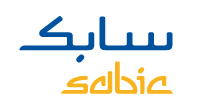
8 Oct 2015
SABIC ANNOUNCES GLOBAL OPERATIONAL TRANSFORMATION TO BETTER MEET CUSTOMER NEEDS
Riyadh, October 8, 2015 - SABIC today announced it is undertaking a global transformation aimed at creating a more agile, cost-efficient, and customer-focused organization that meets their needs more effectively. The company’s new organizational structure is expected to be in place by January 1, 2016.
The reorganization follows a comprehensive review addressing the challenges SABIC faces in the context of the company’s 2025 strategy -- including changes in the market landscape as well as the need to drive technology and innovation. To meet these challenges, the company is optimizing its existing portfolio while at the same time investing in the innovations that are required for future growth.
As a result of this optimization, the commodity products of the Innovative Plastics Strategic Business Unit (SBU) will now be housed in the Chemicals and Polymers SBUs. The remaining Innovative Plastics’ solutions will fall under a newly created SBU called Specialties. This business will serve as the exclusive home for SABIC specialty solutions. Along with the Performance Chemicals SBU, the portfolio of which was reallocated earlier, the Innovative Plastics SBU will cease to exist.
“This reorganization will focus resources more intensively on the needs of each line, enhancing customer intimacy with more focused solutions provision and helping move SABIC to the next level of portfolio product management”, said Yousef Abdullah Al-Benyan, Acting Vice Chairman and CEO of SABIC. “The changes will enhance our global footprint to serve our customers locally while providing solutions globally.”
One of the drivers of this change is the differing technology priorities of commodity and specialty businesses. The future of the commodity line will depend heavily on innovations around advancing feedstock technology. Specialty products face separate technology challenges, including the need to seek out technology acquisitions and partnerships or joint ventures that can enrich SABIC’s existing portfolio.
“This initiative will build a stronger, better SABIC -- one capable of global leadership in meeting customer needs, developing employees and contributing to the communities where we live and work,” said Yousef Abdullah Al-Benyan, Acting Vice Chairman and CEO of SABIC. “We are committed to building a company that provides our employees with the opportunity to grow and develop.”
“We have strong ambitions in terms of growth, market position and innovation,” Al-Benyan added. “Our global 2025 strategy is to be the preferred world leader in chemicals by delivering ‘Chemistry that Matters™’. This includes striving for excellence in areas, such as customer value, environmental protection, health and safety, cost competitiveness and sustainable profit.”
Reader enquiries
Marketing Solutions NV
P.O. Box 6
2950 Kapellen
Belgium
Notes for editors
• SABIC and brands marked with ™ are trademarks of SABIC or its subsidiaries or affiliates.
• High-resolution photos are available upon request.
• SABIC should be written in every instance in all uppercase.
About Saudi Basic Industries Corporation (SABIC)
Saudi Basic Industries Corporation (SABIC) ranks as the world’s third largest diversified chemical company. The company is among the world’s market leaders in the production of polyethylene, polypropylene and other advanced thermoplastics, glycols, methanol and agri-nutrients.
SABIC recorded a net profit of SR 23.3 billion (US$ 6.2 billion) in 2014. Sales revenues for 2014 totaled SR 188.1 billion (US$ 50.2 billion). Total assets stood at SR 340 billion (US$ 90.7 billion) at the end of 2014.
SABIC’s businesses are grouped into Chemicals, Polymers, Agri-Nutrients, Metals and Innovative Plastics. It has significant research resources with innovation hubs in five key geographies – USA, Europe, Middle East, South East Asia and North East Asia. The company operates in more than 50 countries across the world with around 40,000 employees worldwide.
SABIC manufactures on a global scale in Saudi Arabia, the Americas, Europe and Asia Pacific.
Headquartered in Riyadh, SABIC was founded in 1976 when the Saudi Arabian Government decided to use the hydrocarbon gases associated with its oil production as the principal feedstock for production of chemicals, polymers and fertilizers. The Saudi Arabian Government owns 70 percent of SABIC shares with the remaining 30 percent held by private investors in Saudi Arabia and other Gulf Cooperation Council countries.
Editorial enquiries
 Kevin Noels
Kevin Noels
Marketing Solutions NV